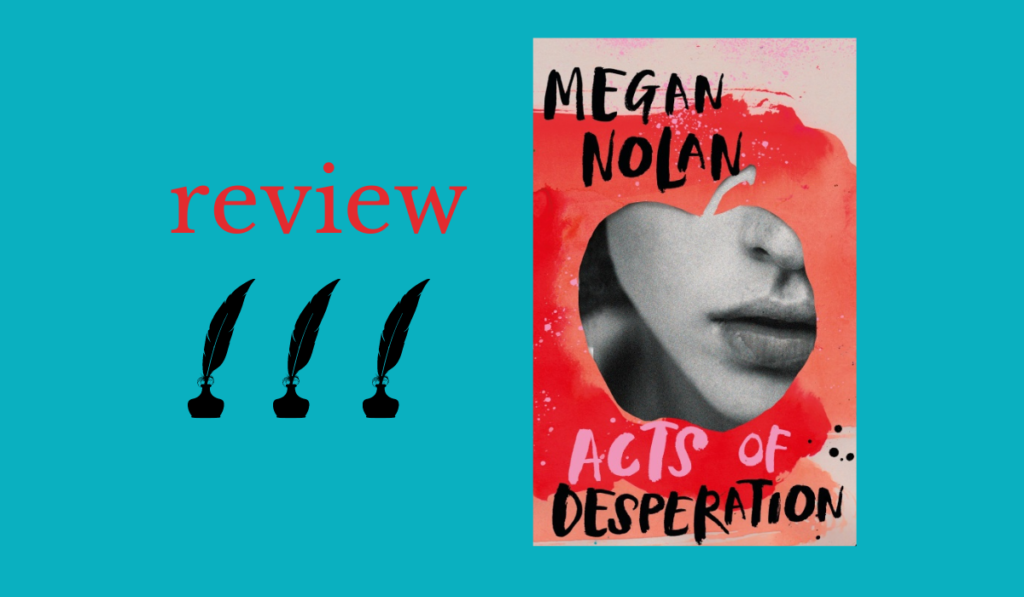
Acts of Desperation|by Megan Nolan|Jonathan Cape|€17.50 Paperback|ISBN: 9781787333369
by Susan McKeever
‘That night after meeting Ciaran I drank until I vomited and blood vessels beneath and above my eyes burst, and I traced them gently in the mirror, knowing they would be markers of a beginning.’
This discomfiting image is a kind we become familiar with in Acts of Desperation, and is a portent of what lies ahead at the dawn of the relationship between the book’s narrator (never named) and the beautiful man she fixated on at a Dublin art opening. Ciaran was ‘that downy, darkening blond of a baby just leaving infancy’. It becomes a relationship that is so dysfunctional and damaging it is uncomfortable to read about, and we wonder why, WHY does she do the things she does? Why does she put up with his moods and his inability to give? But this young woman is determined to find love – ‘Love was the great consolation, would set ablaze the fields of my life in one go’ – and she’s decided that Ciaran is going to be the one to provide this.
Megan Nolan was born in Waterford, moved to Dublin at eighteen, dropped out of college and spent some lost years partying before moving to London, where she finally found her niche, becoming a journalist and essayist for the likes of literary heavyweights The Guardian and The New Statesman.
The Irish part of Nolan’s profile seems very close to her book’s narrator, and she has admitted ‘there’s quite a lot of stuff that is me in it’; describing the story as ‘the dynamic of a woman obliterating herself to be with a man’. But she insists the poisonous relationship is not based on any factual one, rather being a melange of several she has had.
The relationship with the cold, self-centred, controlling Ciaran, being, in his late twenties, a few years her senior, evolves over a series of short sections, broken up into dates between April 2012 and September 2014. Interspersed with these are reflective passages written in Athens in 2019, looking back through a more mature, considered lens, passages which provide a reprieve from the intense, blinded words written while enmeshed in the toxic relationship. Nothing is off-limits in these descriptions – self-harm while obsessively slicing potatoes to make an elaborate pie to placate her love – who is so ‘monk-like’ he actually has no interest in food; secret drinking on the nights he goes out then hiding the evidence; obsessive stalking of his ex-girlfriend Freja’s social media; singing as she scrubs the toilet on her knees with bleach burning the cuts she’s bitten into her hands; lying doubled up on the bathroom floor cutting herself while he sleeps peacefully in the bedroom.
Ciaran’s idea of a good date is to ‘get apples and walk around’ – in contrast to the types of nights her friend Christina describes (which our narrator now eschews in her slave-like devotion to her boy): ‘They would drink wine and prosecco in Christina’s flat, put on make-up …’ They’d go to the pub and drink rum and coke. They’d go clubbing, then for pizza. They’d end up in someone’s house taking pills or coke, laughing and dancing, maybe kissing. If it was a good buzz they’d party the next day too, or stagger out for some junk food at midday.
Snapshots of the past, in a short-burst diaristic style, reveal that it wasn’t just Ciaran who exposed the protagonist’s rubbish self-worth and willingness to have hollow encounters with multiple men, from ‘effete long-limbed DJs’ to much older men – she was ‘young enough to be compelling to them by virtue only of my youth’. More often messily drunk than sober, she annoyed her flatmate by doing stuff like bleeding menstrual blood over her sheets after sleeping with a mutual friend’s boyfriend.
The ‘acts of desperation’ from the title pepper the entire book – even back to when she was eleven and chose chewing gum as an after-school snack to please her weight-obsessed mother, or later hid chicken thighs wrapped in toilet paper in her bedroom drawers to achieve her teenage sought-after stick-thinness.
At just thirty-one, Nolan is less than a decade away from the torturous behaviours of early adulthood, which is why the writing comes across so cleanly, honestly and vividly. It’s a deep, epistolary journey into early-twenties angst, but with none of the sugar-coating that could accompany such a work. It’s out there for the reader, raw, bare, and truthful, and the character’s early words, before we know the half of it, sum it up for me: ‘Oh, don’t laugh at me for this, for being a woman who says this to you. I hear myself speak.’

Susan McKeever is an editor, writer and ghostwriter for several Irish and international publishers and authors. She works from her home in the red-brick heart of Dublin’s Portobello. @MckeeverSusan,susanmckeever.biz











